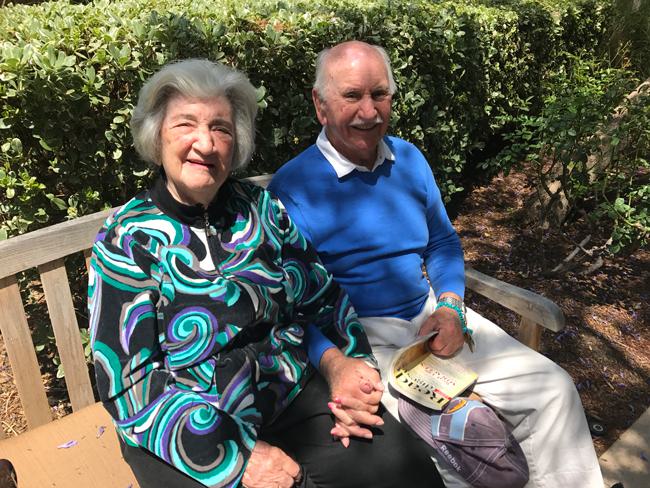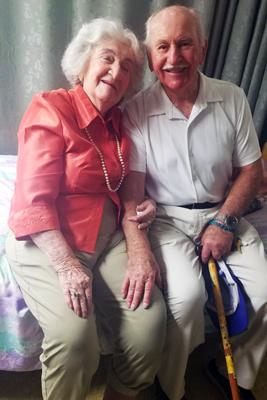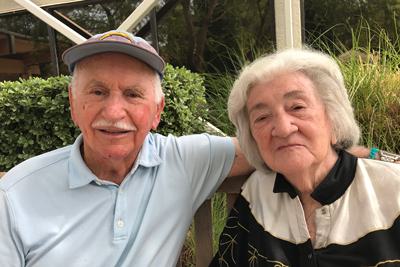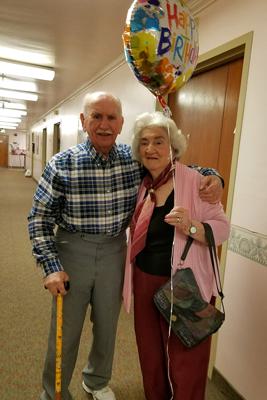Under the Jacaranda Tree


Under the Jacaranda Tree: A Story of Love
By Glenda Hahn

Many lasting and loving relationships are formed at Los Angeles Jewish Health. During this season of love, we want to share this very special and touching story written by Glenda Hahn, the daughter of Mary Freeman.
My mom, Mary, came from a marriage that offered little by way of love or affection. We were led to believe my parents stayed together for the stability of their children.
When my father passed away in 1995, my mom felt like a bird let out of a cage. This was her opportunity to spread her wings and follow her dreams to emigrate from her native South Africa to join me and my family in the United States. My kind and generous husband offered her employment, and thus an avenue to support herself. Mary was independent, caught buses to wherever she wanted to go, made new friends, and created a great and happy life for herself.
When Mom eventually needed more assistance with daily living, we were fortunate to find an excellent facility for her: Los Angeles Jewish Health, formerly the Los Angeles Jewish Home. The slight resistance she initially gave us quickly dissipated when she realized this was a place for her to enjoy playing cards and bingo, learn the computer, and enjoy movies and other activities. She was social, made new friends, and soon realized she had come to the right place.

I’m not sure how Mary and Cyril first connected, but it could have been in discussion of the beautiful jacaranda tree that sat in the gardens of Eisenberg Village, located on one of the Los Angeles Jewish Health campuses. Coincidentally, Cy was also from South Africa, and the tree brought back memories for both of them of the beautiful trees, with their magnetic purple blooms, lining the streets of Johannesburg and Pretoria. The shade of this beautiful tree would later become their meeting place—a spot where they would sit, hand-in-hand, admiring the blossoms and reminiscing about life in the "old country." It was the start of a love story between two nonagenarian expats from South Africa.
Not only did the twosome discover they were from the same country; they came from small cities in close proximity to each other. In fact, Mary’s husband had gone to Cyril’s high school! Now, many decades later, they were sitting cuddled up in a place over 10,000 miles away.

Mary and Cy (as he was called) became known to the residents of Los Angeles Jewish Health as "a couple." They would spend their days in the Newman Lounge watching TV, or in front of the Newman building, where more often than not, at least one of them would doze off. They would reminisce about life in South Africa, talk about their children, and quote excerpts from Hamlet, which they had both studied in high school.
After some time, it became clear Mary required more care. The decision to move her to skilled nursing was a difficult one because separating her from her beau would be hard on both of them. Yet, the separation only brought them closer. With the exception of mealtime, Cy spent nearly every waking moment trekking over to the Max Factor Building to be with Mary.
It seemed nothing was going to keep these two apart…until COVID hit. Quarantine meant they would no longer be able to spend time together. For nearly eight months, they were separated by the virus. Would their relationship be able to weather this storm?
When the pandemic began to wane, Mary, whose memory and cognition had deteriorated, moved to the Goldenberg-Ziman Special Care Center. As it happened, Cy was also suffering from the early stages of dementia – and he, too, moved to the G-Z Building.

American poet Maya Angelou wrote, "Love recognizes no barriers. It jumps hurdles, leaps fences, penetrates walls to arrive at its destination full of hope." Suddenly, the duo were together again, and the connection was still there. Both were hard of hearing, which made verbal communication difficult, but they had each other, their memories, and their mutual longing for South Africa and its beautiful jacaranda trees.
Mary passed away several months ago. This spring, as the jacaranda at Los Angeles Jewish Health begins to bloom, I’ll think with gratitude of my mother, and of Cy, and of the wonderful time they spent together.